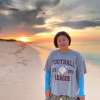Sea Kayaking the Komodo archipelago
Itinerary
-
Day 1 Welcome to Indonesia - Arrive in Labuan Bajo Komodo
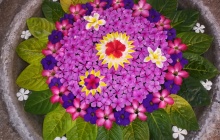 When you arrive at the airport of Labuan Bajo. Your driver will wait you at the airport and transfert you to your hotel in Labuan Bajo.
When you arrive at the airport of Labuan Bajo. Your driver will wait you at the airport and transfert you to your hotel in Labuan Bajo.
- 30m drive in Labuan Bajo
- Night in PURI SARI BEACH HOTEL - 3*: superior room
- No Meals -
Day 2 Labuan Bajo - Menjerite - Pungu Island
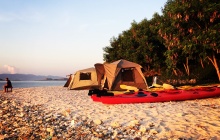 This morning is the start of your Komodo Kayaking adventure. After a safety briefing at Puri Sari beach with your Guide, we’ll begin things with a relatively easy paddle to a local pearl farm. From there, it’s on to Menjerite, famous for its crystal clear water, colourful coral reefs, and majestic views. We’ll overnight on Pungu Island, where we’ll camp in Safari style tents on its white, sandy beaches.
This morning is the start of your Komodo Kayaking adventure. After a safety briefing at Puri Sari beach with your Guide, we’ll begin things with a relatively easy paddle to a local pearl farm. From there, it’s on to Menjerite, famous for its crystal clear water, colourful coral reefs, and majestic views. We’ll overnight on Pungu Island, where we’ll camp in Safari style tents on its white, sandy beaches.
- Overnight in Safari style tents on Seture Island
- Kayak 5.3km & 30km by boat (approximately).
- Meals: B,L,D -
Day 3 Pungu Island - Gado - Rinca Village - Kaaba - Toro Buaya
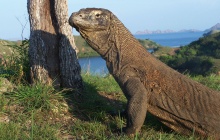 After waking, and an optional early morning swim, you will board the support boat for breakfast before starting our first paddle to Gado – with its wonderful mangroves and some amazing snorkelling, we’ve a special spot with giant table corals, plenty of fish and fingers crossed, turtles, who hopefully swim by to say hello. We’ll then kayak to Rinca Village School. To end our day, we’ll take in the sunset at Kaaba, a small mangrove island which is inhabited by bats. This is a wonderful sight enjoyed from our top deck – watching thousands of bats flying into the night sky in search of their evening meal. Overnight on board our boat at Toro Buaya
After waking, and an optional early morning swim, you will board the support boat for breakfast before starting our first paddle to Gado – with its wonderful mangroves and some amazing snorkelling, we’ve a special spot with giant table corals, plenty of fish and fingers crossed, turtles, who hopefully swim by to say hello. We’ll then kayak to Rinca Village School. To end our day, we’ll take in the sunset at Kaaba, a small mangrove island which is inhabited by bats. This is a wonderful sight enjoyed from our top deck – watching thousands of bats flying into the night sky in search of their evening meal. Overnight on board our boat at Toro Buaya
- Overnight on board our boat at Toro Buaya
- Kayak 12.5km (approximately)
- Meals: B,L,D -
Day 4 Toro Buaya - Padar - Kalong Island
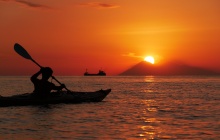 We’ll weight anchor early, with our support boat ferrying us to Padar Island where we’ll warm things up with a picturesque walk. Journeying on to Pink Beach, we’ll take time both in and on the water with a lovely snorkel and kayak. Tonight, we’re again aboard the boat, moored off Kalong Island.
We’ll weight anchor early, with our support boat ferrying us to Padar Island where we’ll warm things up with a picturesque walk. Journeying on to Pink Beach, we’ll take time both in and on the water with a lovely snorkel and kayak. Tonight, we’re again aboard the boat, moored off Kalong Island.
- Overnight in Safari style tents
- Kayak 7.2km & 9km by boat (approximately)
- Meals: B,L,D -
Day 5 Kalong Island - Komodo - Manta Point - Sebayur Kecil
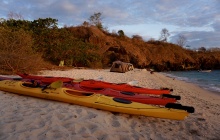 This morning, our boat ferries us to one of the highlights of the trip, Komodo Island. It’s here that we’ll cautiously spy these impressive beasts in their natural environment. We’ll then again ride our support boat to Manta Point. One of the highlights of this trip is snorkelling at Manta Point, and hopefully, these gracious animals will delight us with their presence. After lunch, you will then start paddling towards Sebayur Kecil for your last beach camp of the expedition. Sebayur Kecil has a beautiful beach with some great coral reefs and fish population so a spot of snorkelling in the late afternoon or early the next morning is certainly encouraged. Overnight in Safari style tents.
This morning, our boat ferries us to one of the highlights of the trip, Komodo Island. It’s here that we’ll cautiously spy these impressive beasts in their natural environment. We’ll then again ride our support boat to Manta Point. One of the highlights of this trip is snorkelling at Manta Point, and hopefully, these gracious animals will delight us with their presence. After lunch, you will then start paddling towards Sebayur Kecil for your last beach camp of the expedition. Sebayur Kecil has a beautiful beach with some great coral reefs and fish population so a spot of snorkelling in the late afternoon or early the next morning is certainly encouraged. Overnight in Safari style tents.
- Overnight in Safari style tents
- Kayak 10 km and 9km by boat (approximately)
- Meals: B,L,D -
Day 6 Sebayur Kecil - Kanawa - Gua Rangko - Seraya - Labuan Bajo
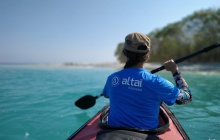 After enjoying your last breakfast out in the beautiful Komodo National Park and maybe a swim or snorkel just off the beach you will then make your way paddling through the mangroves towards Kanawa for one last snorkel and swim before you hit the last open stretch of kayaking. It will be then time to say goodbye to the crew before you arrive back at the Puri Sari Beach Hotel by mid afternoon.
After enjoying your last breakfast out in the beautiful Komodo National Park and maybe a swim or snorkel just off the beach you will then make your way paddling through the mangroves towards Kanawa for one last snorkel and swim before you hit the last open stretch of kayaking. It will be then time to say goodbye to the crew before you arrive back at the Puri Sari Beach Hotel by mid afternoon.
- Night in PURI SARI BEACH HOTEL - 3*: superior room
- Kayak 19km (approximately)
- Meals: B, L -
Day 7 Farewell Komodo - End of your trip
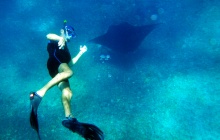 You driver will pick you up at your hotel and transfert to the airport according to your flight schedule. End of our service.
You driver will pick you up at your hotel and transfert to the airport according to your flight schedule. End of our service.
- 30m drive
- Meals: B
Dates & prices
International departures:
No departure for now
Trip code: KAYAKKOM
Included
- 1 nights accommodation in cabin on support boat
- Professional local English speaking guide throughout expedition
Not included
-Airport Tax
Notes
Terms and conditions
Booking conditions
Invoice procedure
Cancellation policy
- Cancellation received more than 30 days prior to the departure date: a sum of €50 per person will be retained
- Cancellation received 30 to 21 days before the departure date: your deposit, 30% of the total trip price will be retained
- Cancellation received 20 to 14 days before the departure date: 50% of the total trip price will be retained
- Cancellation received 13 to 7 days before the departure date: 75% of the total trip price will be retained
- Cancellation received less than 7 days before the departure date: 100% of the total trip price will be retained
- Fixed airfares: if your airline ticket was issued in advance, often done to avoid significant surcharges, you will be charged 100% of any non-refundable fees if you wish to change or cancel your flight plan.
- Fixed in-country costs: early charges for firm bookings will be charged if you cancel or modify your trip.
- Insurance costs: if you have taken out comprehensive or cancellation insurance, the cost of insurance is due and cannot be refunded.
Changes to travel contract
Pricing
Contract transfer
Insurance
Practical info
Staff
Food
Please be aware that the tap water in Indonesia is not drinkable.
If you are suffering from severe food allergies please advise our team
beforehand. Further, we request to bring along an Epipen for on-the-spot treatment!
Accommodation
Sleeping and Camping Arrangements
You will spend most nights of the trip in a mosquito-proven safari-style tent. We also provide you
with a stretcher bed. While camping on the beach we do not provide any sleeping bags, pillows,
or sheets due to hygiene reasons. Nights in the Park are fairly warm, especially in the tents,
however, we suggest bringing a lightweight sleeping bag or sleeping bag liner and a couple of
sarongs which can be used as a sheet or blanket. The crew will install a toilet tent with a toilet
seat for your use at the campsite. Our support boat facilities include two bathrooms, with a hand
shower, a flushing toilet, and hand basins. The boat has multiple socket outlets. However, we
suggest charging your phones and any other devices during the day while the engine is running
The boat has air-conditioned sleeping cabins. However, the AC is powered by a generator which
will be switched off during the night to avoid noise pollution. During the night you are free to make
use of the battery-powered marine fans in the cabins. Bedding and towels are provided in the
cabins. Once you have boarded the support boat on the first day of kayaking, you will be shown
to your cabin, where you can store your belongings. During your trip, you might have the
unpleasant experience of noticing some rubbish, left by local tourists or swept ashore by the sea,
on some of the islands we visit. Please refrain from littering at any time and make sure you take
back everything you brought to the islands. During the trip, we clean up the beaches of every
island we set camp on, but this is an ongoing process. You are welcome to join in the beach clean-up if you wish. Further, we suggest that if you take any batteries into the country, take them
with you out of the country once you are leaving. Most of the lesser developed countries do not
have the proper facilities to take care of used batteries.
Budget & exchange
The currency in Indonesia is the Indonesian Rupiah, Rp (IDR)
Visit http://www.xe.com for the latest currency converter and exchange rates. You can withdraw Indonesian Rupiahs from in-
country ATMs or exchange money at the airport/local currency exchange offices. ATMs and exchange desks are only found on
bigger islands like Bali (Denpasar, Ubud, Sanur). The cost of an average meal in Java is around 3US$ to 8US$; in Bali it is 4US$ to
11US$.
When purchasing souvenirs, we ask that our travelers resist the temptation to buy traditional items which are part of local
families/the countries heritage. We also ask our travelers to respect the Species Protection Agreements (CITES) which aims to
protect more than 2,500 species of animals and 30,000 species of threatened plants by prohibiting the trade of hides, ivory, scales, corals, shells, and the import of live exotic animals.
Tips
Vital equipment
- - Kayaking booties or trekking sandals to protect your heels
- - Kayaking gloves or trekking gloves to protect blisters
- - Kayaking glasses with a retaining cord
- - Long sleeve shirt or rash shirt (sun protection shirt)
- - Knee long shorts
- - Trekking hat with cord to protect you from the sun
- - Small dry bag to store your personal gear on your kayak
a lightweight sleeping bag or sleeping bag liner and a couple of
sarongs which can be used as a sheet or blanket.
Helpful equipment
Your Guide will show you where to snorkel and where to find the best coral or fish. Please follow
his instructions at all times. The Komodo Park is known for its strong currents and our Guide will
point out where it will be safe for you to snorkel. You are snorkeling with wildlife and at no time
should you chase or touch any dolphins, turtles, manta rays or other fauna. You are welcome to
watch or swim with them as long as you keep your distance and they do not feel threatened by
your presence. Some of them might be curious and might come closer to check you out. Avoid
touching any coral or fish with your flippers while snorkeling and do not snorkel in low-tight as you
could injure yourself on the corals. Coral can give you nasty cuts which often get infected. We
recommend bringing some waterproofed dressing and alcohol swabs. Further, we suggest
wearing your rash shirt while snorkeling to protect your skin from sunburn.
Trekking in The Komodo National Park
The Komodo National Park is a protected wildlife zone and trekking in the Park should only
be done in the allocated areas. Please follow your Guide or the Rangers at all times and do
not divert on any other tracks. Please wear appropriate walking boots and clothing (enclosed
shoes or trekking sandals, sun-protecting gear, and a hat). Please bring along sunscreen and
mosquito repellent.
You may also want to bring:
- A camera and spare batteries/portable charger
- A power plug travel adapter
- A head torch and spare batteries
- A pocket knife
- A fast drying micro-fibre beach towel
- A bath towel
- Blister plasters
- A small personal first aid kit
- Zip lock bags to protect your important documents and electronics
- A laundry bag/bin bag for your dirty clothes
- Tissues
- Earplugs
Luggage
Please bring a small rucksack to use as a day bag. You can bring this as hand luggage on the airplane. You will carry your lunch,
water, spare layers and any personal medication with you each day in this bag. You will also need a larger bag to store your other
clothes and belongings in, please ensure that this is a soft bag like a rucksack or holdall rather than a hard cased suitcase because
it is more practical. We recommend packing all of your clothes in plastic bags so that they stay dry in the event of wet weather.
Medicine
Your guide is a trained first-aider and will carry a full first aid kit at all times during the trip. We recommend that you bring a small
personal first aid kit containing any medication you may need such as inhalers, plasters, antiseptic and painkillers.
Passport
To go to Indonesia travelers need a passport which is valid for at least six months after the date of entry. It is your responsibility
to confirm your specific passport requirements and proof of onwards travel is required.
Visa
Travelers staying in Indonesia for less than 30 days do not need to obtain a visa. It is your responsibility to confirm your specific
visa requirements.
Health information & recommendations
It is your responsibility to check that your personal insurance covers everything in this trip. A consultation with your doctor is a
prerequisite for any trip. Malaria prophylaxis is advised if your trip goes to Flores, Komodo, Sumatra, Sulawesi, the Sundra Islands
or Kalimatan. Anti-malaria treatments are not necessary in Bali, Java or Lombok. Avoid contact with mosquitoes as much as
possible: apply repellents, wear long trousers/sleeves and sleep with a mosquito net. The World Health Organisation can provide
further details of the latest health news and medical advice.
Weather
Kayaking in The Komodo National Park
Conditions
Electricity
Indonesia uses European-style plugs with two round pins. Voltage is normally 220 V 50 Hz except in a few places where it is 110
V.
Local time
Indonesia is spread across three time zones. The Lesser Sunda Islands use Coordinated Universal Time (UTC)/ Greenwich Mean
Time (GMT) +8. Indonesia does not use Daylight Saving Time (DST).
Topography
A lot of guests are asking what they can bring along to hand out to the children during the
school visit. We suggest you only bring a small number of supplies, something light to carry
in your luggage. The school and the children are always happy to receive any donations like
writing materials, colouring books, cards, pens, pencils, stickers, and sports equipment, such
as tennis balls, skipping ropes, bats, balls, etc. Please do not feel obliged to bring anything
with you to donate to the school as this is a personal choice. Please refrain from handing out
lollies. There are no dentists located on the islands.
Sustainable tourism
The Leave No Trace policy can be summarized in 7 simple steps which we hope you will follow during our trip...
We expect all who travel with us to support and uphold our Sustainable Tourism philosophies.


